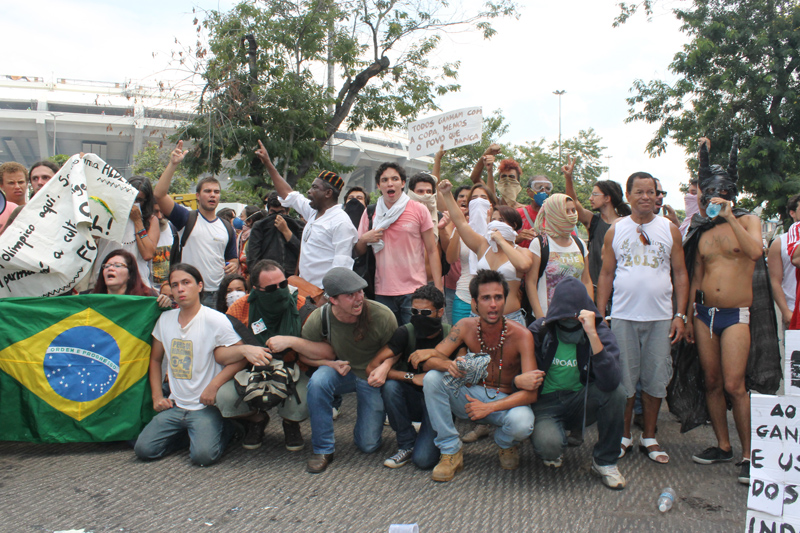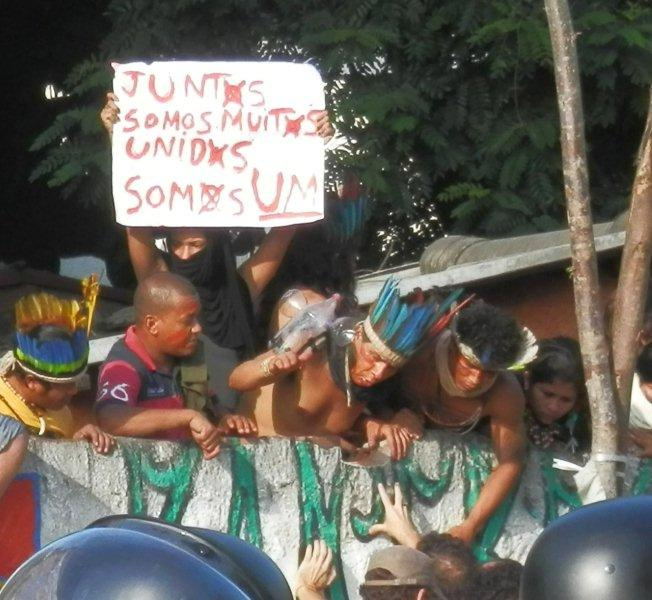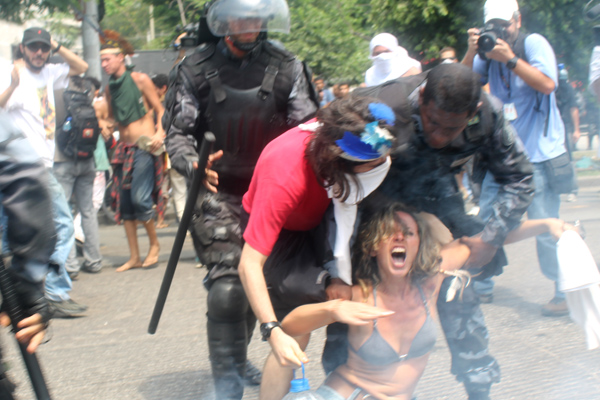[All links lead to pages in Portuguese unless otherwise specified].
Brazilian riot police violently evicted a group of indigenous people from a former museum they had occupied in Rio de Janeiro to make way for 2014 World Cup construction.
Baton-wielding police agents stormed the one-time Museum of the Indian building on 22 March, 2013, launching tear gas and tussling with the indigenous people and their supporters who had set up barricades overnight to repel the invasion.
The building is close to the city's famous Maracanã Stadium [en] and will be made into a sports museum ahead of the 2014 World Cup [en] and the 2016 Olympic Games [en].
Brazilian authorities previously tried to oust the building's indigenous residents, who have become known as the Maracanã Village and have occupied the empty space for six years, in January. Maracanã Village now becomes the latest [en] in a series of evictions [en] that have drawn criticism from human rights defenders [en] as Brazil prepares to host the World Cup.
Activist Paula Kossatz posted a video on Facebook which shows the police arresting protesters at dawn ahead of the invasion.
The collective Diário Liberdade reported that the police force behind the eviction was about one hundred agents strong equipped with “rubber bullets, pepper spray, and batons”:
Ao que parece, segundo as primeiras informações, houve moradores da Aldeia Maracanã feridos na sequência da invasão. Entre eles, um menino de quatro anos que sofreu as consequências do gás pimenta policial. Ainda, uma mulher grávida foi reprimida violentamente e presa.
It seems, according to preliminary information, that there were residents from the Maracanã Village who were injured as a result of the invasion. Among them, a four-year old boy who suffered the consequences of pepper spray. Also, a pregnant woman was violently restrained and arrested.
On 12 January, 2013, Global Voices covered the first attempt [en] to boot out roughly 23 families living in the historical building. In that incident, military police with the help of riot squads laid siege to the “living museum” of indigenous people, as Maracanã Village is called by many people nowadays, without any prior warning or court order. The attempt mobilised indigenous people and protesters who successfully prevented a planned demolition.
A little more than a month later, the state of Rio de Janeiro Governor Sérgio Cabral announced that the building would be converted into a Brazilian Olympic Committee museum. Eliomar Coelho, a Rio de Janeiro city councilor for the Socialism and Freedom Party [en], proposed that the site be designated a national heritage, but the proposal was rejected on 14 March, 2013.
Only 12 former dwellers of Maracanã Village (the official press release says 22) accepted the state government's proposal to stay temporarily in a settlement of containers in the patio of a former leprosy hospital in Jacarepaguá, where a Cultural Center for Indigenous Peoples is expected to be constructed. The place houses more than two thousand people and was rejected by the majority of the indigenous group because it is isolated and offers no jobs perspectives.
Outraged by the decision to evict them from the site, the 75 indigenous people living in Maracanã Village decided to resist and did not do it on their own, as Fluminense Federal University professor Fernanda Sánchez reported on the Blog da Raquel Rolnik:
As lideranças indígenas são apoiadas por diversos movimentos sociais, estudantes, pesquisadores, universidades, comitês populares, organizações nacionais e internacionais de defesa dos Direitos Humanos, redes internacionais e outras organizações da sociedade civil. A luta dos índios e o conflito estabelecido entre o governo e o movimento resultaram num importante recuo do governo, que diante da pressão social desistiu da demolição do prédio e passou a defender a sua “preservação”. A desocupação do prédio foi decretada, com hora marcada.
The indigenous leaderships are supported by several social movements, students, researchers, universities, popular committees, national and international Human Rights organizations, international networks and other civil society organizations. The indigenous struggle and the conflict established between the government and the social movement resulted in a significant government retreat when, in face of the social pressure, it gave up the demolition of the building and started to stand for its “preservation”. The forced eviction of the building was declared to happen according to appointment.

Protesters closed off the avenue Radial Oeste after military police entered into the Maracanã Village. Photo by Artur Romeu. Used with permission.
And she concluded:
Os manifestantes, em absoluta condição de desigualdade frente à força policial e seu aparato de violência, lançaram mão de instrumentos bem diferentes daqueles utilizados pelo Batalhão de Choque: ocuparam o prédio para apoiar os índios, resistiram à sua desocupação e manifestaram, no espaço público, nas ruas e avenidas do entorno do complexo do Maracanã, sua reprovação e indignação frente à marcha violenta desta política.
The protesters, absolutely outmatched by the police force and their apparatus of violence, resorted to instruments quite different from those used by the riot squad: they occupied the building in order to give their support to the indigenous group; resisted to its eviction; and protested, in the public space, in the streets and avenues within the Maracanã complex, to show their disapproval and outrage in the face of violent political development.
During the eviction, journalists trying to do their job as well as activists were hit by pepper spray and some were injured by the police. Cartoonist Caros Latuff recorded images of the police brutality and posted them on YouTube:
While criticizing police violence in a video interview, federal Congressman Marcelo Freixo, who is the chairman for the Committee for Human Rights in the Legislative Assembly of Rio de Janeiro, was taken by surprise as police launched tear gas nearby. The collective Juntos reproduced his words on Facebook:
A PM agiu arbitrariamente. Não era preciso o uso da força. Era um grupo pequeno que estava lá quando o Batalhão de Choque entrou. Mesmo que alguns resistissem, era possível a retirada das pessoas sem violência. Chegaram a lançar spray de pimenta nos parlamentares, no promotor e no defensor público.
The military police acted in an arbitrary fashion. There was no need to make use of force. It was a small group who was there when the riot squad came in. Even in the case of resistance on the part of some, it would still be possible to remove the people without violence. They even used pepper spray against the congressmen, the prosecutor, and the public defender.
Activist Bruno Guimarães wrote an extensive report on Facebook about the violent eviction process which he witnessed:
Todos os que estávamos por lá, mais de 500 pessoas, receberam gás lacrimogênio, pois fomos cercados e ora a polícia de um lado, ora a de outro, nos atacava, não havendo ponto de fuga. Os membros da imprensa protestavam, os manifestantes também, alvos de uma violência despropositada. A hora seguinte foi de batalha campal. E de sadismo, policiais que gritavam “voltem para a floresta, seus índios”, ou que riam de nós por não termos as máscaras para nos proteger do gás. Cheguei em um deles, pedi para poder sair dali, disse que não era do Rio, era turista, questionei tanta violência, e ele me disse “pois estamos fazendo isso daqui é para vocês, turistas, mesmo. Só estamos cumprindo ordens”.
All of us who were there, more than 500 people, were hit by tear gas, because we were surrounded and it was one time the squad on one side, another time the squad on the other side who attacked us, no way of fleeing. The press people complained, the protesters too, targets of unreasonable violence. The following hour was a field battle. And there was sadism, policemen who cried “go back to the forest, you Indians , or otherwise they laughed at us for not having the masks that would protect us from the tear gas. I came close to one of them, asked to be let free, I said I was not a resident of Rio, that I was a tourist there, I questioned the reason for so much violence, and he said to me “we are doing this exactly for you, tourists. All we are doing is following orders”.
The Agência de Notícias das Favelas (Slums News Agency) posted on YouTube a video that shows tear gas being thrown at protesters:
Guilherme Pimentel, from the collective magazine Vírus Planetário, wrote a brief report on the mistakes made during the eviction:
1 – O governo (Secretaria de Assistência Social e Direitos Humanos do Estado) se negou a negociar no local e disse que só negociaria depois de retirados todos os indígenas. Essa postura gerou um grande impasse.
2 – Os oficiais de justiça preferiram a velocidade do que a qualidade do cumprimento da “ordem” de despejo, vetando propostas que tomariam muito tempo e ignorando inclusive a condição expressamente colocada pelo juiz de não utilizar nenhuma forma de violência.
3 – A PM descumpriu sua palavra de não agir com violência na desocupação do local, mesmo com os manifestantes já cedendo e saindo por vontade própria, já com os portões abertos e sem cadeado…
1 – The government (State Secretary for Social Service and Human Rights) refused to negotiate at the site and said that it would only negotiate after all the indigenous people had been evicted. Such attitude generated a serious deadlock.
2 – Justice officials preferred speed over quality in the compliance of the eviction “order”, vetoing proposals that would take a long time and even ignoring the condition explicitly placed by the judge not to use any form of violence.
3 – Military police failed to comply with their word not to act violently during the eviction, even with the demonstrators already yielding and leaving at will, with the gates already open and without a lock …
Activist Pedro Rios Leão recorded several scenes of violence against protesters, as well as YouTube user Aquilante Leonel:
Federal Congressman Chico Alencar, a member of the Socialism and Freedom Party, stated on Facebook that the fight will go on:
Marx escreveu que ‘a história só se repete como tragédia ou como farsa’. Taí: Cabral invadiu a Aldeia Maracanã, com suas naus cruzadistas, e expulsa seus nativos. Mas a luta vai prosseguir, e os ‘conquistadores’ contemporâneos, mercadores dos espaços urbanos, encontrarão resistência!
Marx wrote that “History only repeats itself as tragedy or as farce”. That is it: Cabral invaded Maracanã Village with his crusader ships and expels his natives. But the struggle shall go on, and the “conquerors” of today, merchants of the urban space, will meet resistance!









16 comments